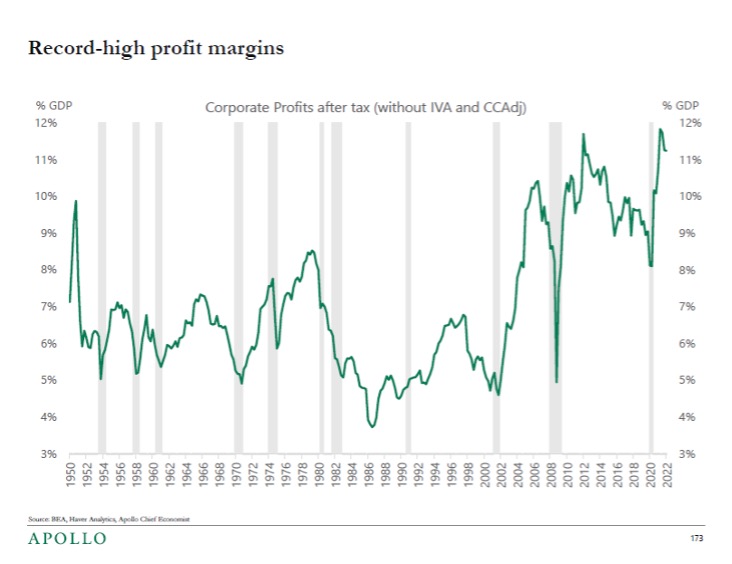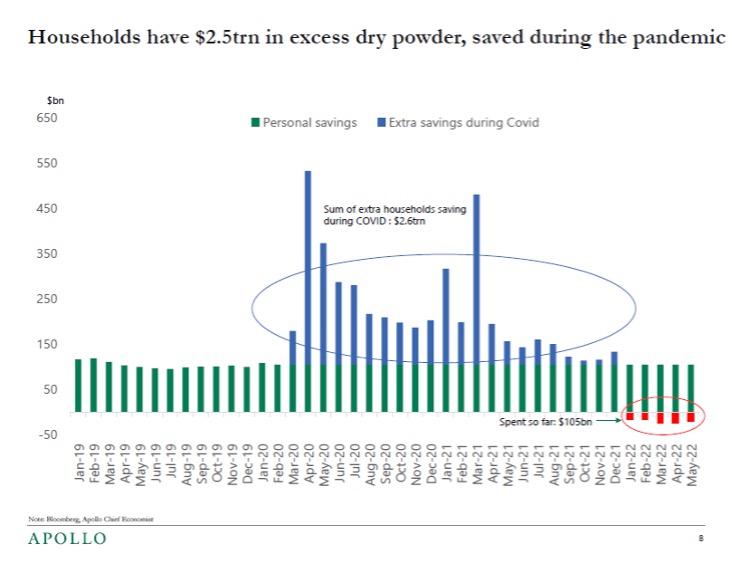This is the most anticipated recession ever. Maybe it is so anticipated that firms and households are so prepared for a slowdown that we may end up not having a recession.
There are two important reasons why we could get a soft landing:
- Corporate profit margins are near all-time highs, and corporate cash balances are near record-highs, which gives companies room to absorb declines in demand without having to lay off workers, see the first chart below.
- Consumers have record-high savings, which means that households will still have money to support consumer spending even if the unemployment rate starts rising, see the second chart.
The bottom line is that we could get a soft landing because both firms and households have significant buffers to deal with a negative hit to demand and incomes.
The implication for markets is that once the Fed pivots from hawkish to dovish, either because of inflation rolling over or growth slowing, credit markets and stock markets could move higher. The next data release to watch is the employment report this coming Friday, where the consensus currently expects nonfarm payrolls at 275,000, unemployment at 3.6%, and average hourly earnings at 5.1%.
Any softening in the labor market and, in particular, in average hourly earnings would push the Fed in a more dovish direction because it would mean that the Fed has finally succeeded in slowing down the economy and ultimately inflation.
This presentation may not be distributed, transmitted or otherwise communicated to others in whole or in part without the express consent of Apollo Global Management, Inc. (together with its subsidiaries, “Apollo”).
Apollo makes no representation or warranty, expressed or implied, with respect to the accuracy, reasonableness, or completeness of any of the statements made during this presentation, including, but not limited to, statements obtained from third parties. Opinions, estimates and projections constitute the current judgment of the speaker as of the date indicated. They do not necessarily reflect the views and opinions of Apollo and are subject to change at any time without notice. Apollo does not have any responsibility to update this presentation to account for such changes. There can be no assurance that any trends discussed during this presentation will continue.
Statements made throughout this presentation are not intended to provide, and should not be relied upon for, accounting, legal or tax advice and do not constitute an investment recommendation or investment advice. Investors should make an independent investigation of the information discussed during this presentation, including consulting their tax, legal, accounting or other advisors about such information. Apollo does not act for you and is not responsible for providing you with the protections afforded to its clients. This presentation does not constitute an offer to sell, or the solicitation of an offer to buy, any security, product or service, including interest in any investment product or fund or account managed or advised by Apollo.
Certain statements made throughout this presentation may be “forward-looking” in nature. Due to various risks and uncertainties, actual events or results may differ materially from those reflected or contemplated in such forward-looking information. As such, undue reliance should not be placed on such statements. Forward-looking statements may be identified by the use of terminology including, but not limited to, “may”, “will”, “should”, “expect”, “anticipate”, “target”, “project”, “estimate”, “intend”, “continue” or “believe” or the negatives thereof or other variations thereon or comparable terminology.








